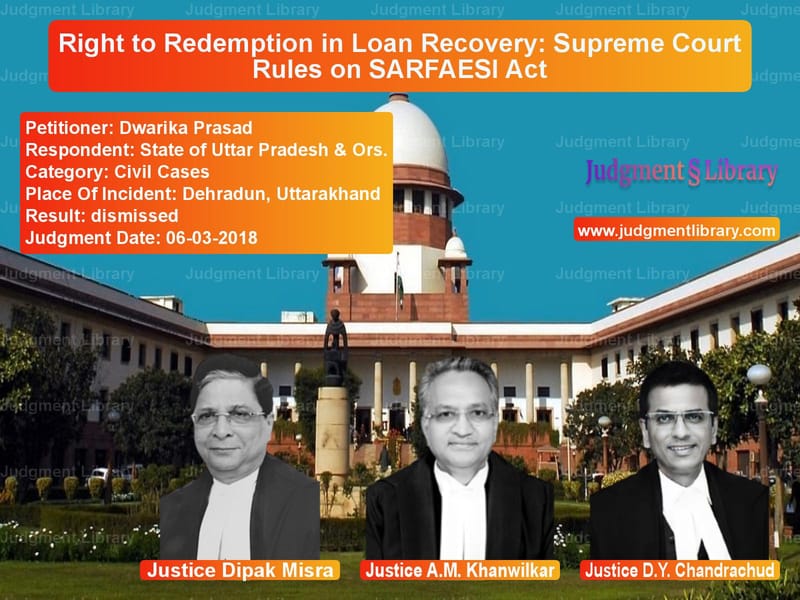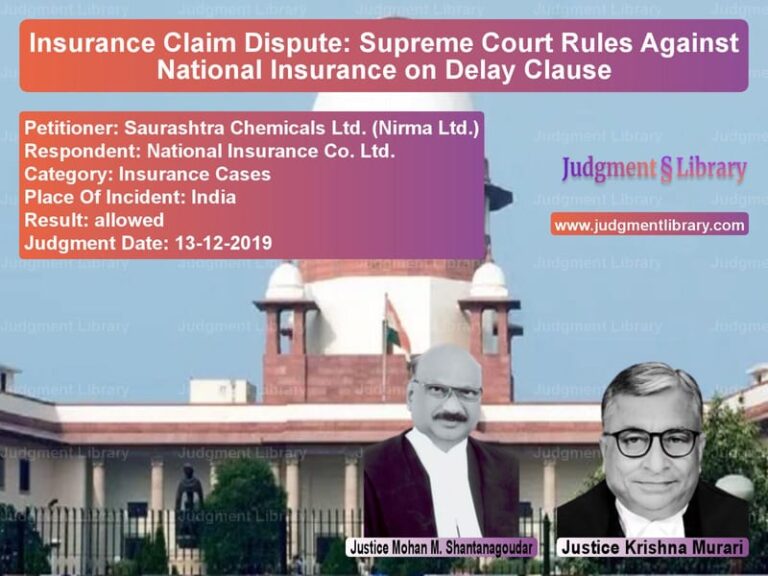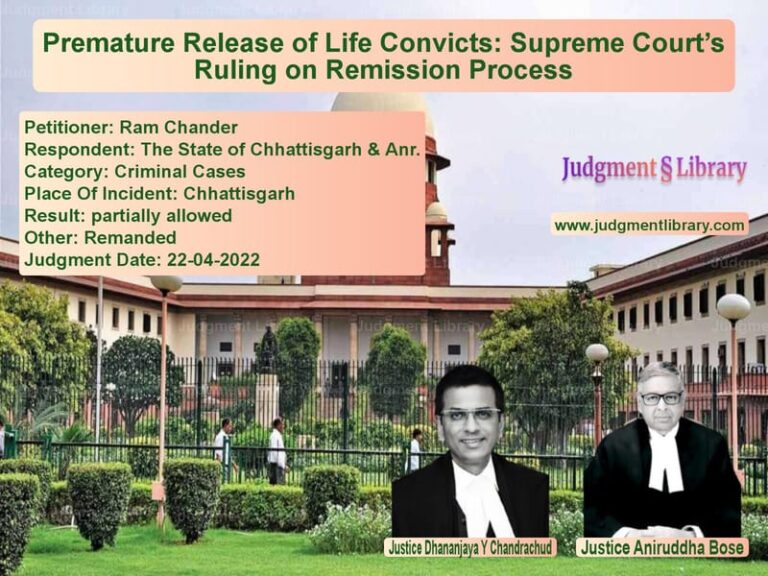Right to Redemption in Loan Recovery: Supreme Court Rules on SARFAESI Act
The Supreme Court of India, in Dwarika Prasad v. State of Uttar Pradesh & Ors., addressed a crucial issue concerning the rights of a guarantor in a loan recovery case under the Securitisation and Reconstruction of Financial Assets and Enforcement of Security Interest Act, 2002 (SARFAESI Act). The ruling emphasized the statutory limitations on exercising the right of redemption after a secured asset has been auctioned and a sale deed registered.
Background of the Case
The appellant, Dwarika Prasad, stood as a guarantor for an educational loan granted to Jitendra Kumar. The loan was sanctioned with a ‘repayment holiday’ period of 24 months, meaning repayment was to start by June 20, 2011. As security, the appellant provided an equitable mortgage on his property in Dehradun.
Due to continued defaults, the bank classified the loan as a non-performing asset (NPA) on September 3, 2013. Subsequently, the bank initiated proceedings under Section 13(2) of the SARFAESI Act and issued a recall notice on September 12, 2013. After repeated failures to respond or deposit the outstanding dues, the bank took symbolic possession of the property on February 14, 2015. The property was put up for an e-auction on March 30, 2015, but no bidders emerged.
A second e-auction on January 30, 2016 attracted a bid, leading to a confirmed sale on February 2, 2016. The appellant, however, challenged the sale, asserting his right to redeem the property.
Key Events
- Loan repayment was due from June 20, 2011, but defaults occurred.
- Bank declared the loan a non-performing asset (NPA) on September 3, 2013.
- Bank issued a recall notice on September 12, 2013, under Section 13(2) of the SARFAESI Act.
- Symbolic possession of the mortgaged property was taken on February 14, 2015.
- First auction attempt on March 30, 2015, failed due to no bidders.
- Second auction on January 30, 2016, received a bid, leading to confirmation on February 2, 2016.
- Sale certificate was issued on April 5, 2016, and a sale deed was executed in favor of the auction purchaser.
Legal Issues Before the Supreme Court
The Supreme Court examined the following legal issues:
- Whether the appellant could exercise his right to redeem the property under Section 13(8) of the SARFAESI Act after the auction sale was confirmed.
- Whether the bank acted arbitrarily in rejecting the appellant’s proposal to clear dues.
- Whether the auction process was legally compliant and provided sufficient opportunity to the appellant.
Arguments of the Parties
Petitioner’s (Dwarika Prasad’s) Arguments
- The appellant argued that he had expressed willingness to pay the outstanding dues before the sale was confirmed.
- The bank unfairly rejected his redemption request, despite a partial payment of Rs. 7,00,000.
- The High Court incorrectly applied the SARFAESI Act by allowing the sale despite his intention to clear the entire debt.
Respondent’s (State of Uttar Pradesh & Bank) Arguments
- The appellant had multiple opportunities to pay but failed to act in a timely manner.
- The sale process was conducted legally, and the auction was finalized before the appellant attempted redemption.
- The appellant’s writ petition before the Allahabad High Court was withdrawn voluntarily, and no stay was granted on the sale.
Supreme Court’s Analysis and Judgment
The Supreme Court bench, comprising Chief Justice Dipak Misra, Justice A.M. Khanwilkar, and Justice Dr. D.Y. Chandrachud, analyzed the statutory provisions and previous rulings on the right of redemption.
1. Right to Redemption Under Section 13(8)
Section 13(8) of the SARFAESI Act states:
“If the dues of the secured creditor together with all costs, charges, and expenses incurred by him are tendered to the secured creditor at any time before the date fixed for sale or transfer, the secured asset shall not be sold or transferred by the secured creditor, and no further step shall be taken by him for transfer or sale of that secured asset.”
The Court emphasized that the right to redeem exists only before the sale is confirmed. The Court ruled:
“The right of the mortgagor to redeem the property survives until there has been a transfer of the mortgagor’s interest by a registered instrument of sale.”
2. Timeliness of Redemption Offer
The Court found that the appellant did not comply with the statutory timeline for redemption. He had been granted multiple extensions but failed to pay the full dues within the prescribed period. The Court noted:
“The appellant failed to ensure compliance with Section 13(8). The right to redemption stands extinguished on the execution of the registered sale deed.”
3. Bank’s Conduct and Auction Legality
The Supreme Court upheld the High Court’s view that the bank had followed due process in conducting the auction. The Court stated:
“The bank had advertised the proposed sale by auction and followed all requisite procedures under law. The appellant failed to comply with the provisions of Section 13(8) and cannot assert an equity of redemption upon the completion of the sale.”
Final Judgment
The Supreme Court dismissed the appeal, affirming the legality of the auction and sale. However, it ordered the bank to refund Rs. 7,00,000 deposited by the appellant with an interest of 9% per annum. The Court directed:
- The bank must refund Rs. 7,00,000 with interest within 8 weeks.
- The appellant cannot claim further rights over the property.
- The auction sale remains valid and enforceable.
Impact of the Judgment
This ruling has significant implications for loan recovery and property redemption under the SARFAESI Act:
- Strict Interpretation of Redemption Rights: Borrowers and guarantors must redeem secured assets before the confirmed sale.
- Timely Compliance: Courts will not intervene if debtors fail to act within the stipulated timeframe.
- Finality of Registered Sale Deeds: Once a sale is registered, redemption rights are extinguished.
Conclusion
The Supreme Court’s decision in Dwarika Prasad v. State of Uttar Pradesh & Ors. reinforces the legal framework governing loan defaults and property auctions. The ruling underscores the importance of adhering to statutory timelines for loan repayment and redemption while upholding the rights of financial institutions to recover dues efficiently.
Petitioner Name: Dwarika PrasadRespondent Name: State of Uttar Pradesh & Ors.Judgment By: Justice Dipak Misra, Justice A.M. Khanwilkar, Justice D.Y. ChandrachudPlace Of Incident: Dehradun, UttarakhandJudgment Date: 06-03-2018
Don’t miss out on the full details! Download the complete judgment in PDF format below and gain valuable insights instantly!
Download Judgment: Dwarika Prasad vs State of Uttar Prade Supreme Court of India Judgment Dated 06-03-2018.pdf
Direct Downlaod Judgment: Direct downlaod this Judgment
See all petitions in Debt Recovery
See all petitions in Contract Disputes
See all petitions in Banking Regulations
See all petitions in Judgment by Dipak Misra
See all petitions in Judgment by A M Khanwilkar
See all petitions in Judgment by Dhananjaya Y Chandrachud
See all petitions in dismissed
See all petitions in supreme court of India judgments March 2018
See all petitions in 2018 judgments
See all posts in Civil Cases Category
See all allowed petitions in Civil Cases Category
See all Dismissed petitions in Civil Cases Category
See all partially allowed petitions in Civil Cases Category







